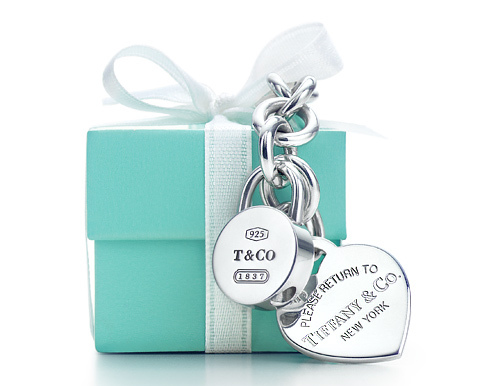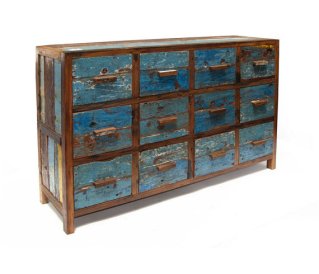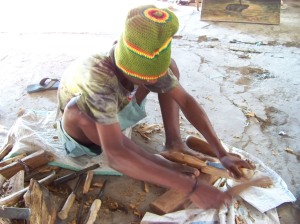So, you folks know that I primarily sell Hieropice’s
wares on Etsy, a site for handmade crafts/art. The sale of vintage
goods (more than 20 years old) and supplies (for making art/craft) are
also sold on Etsy.
Periodically, the admins at Etsy will choose a shop to feature on their front page. They’ll interview the shop’s artisans, post their photos and photos of their work, all on Etsy’s homepage, and it typically gives a massive boost to a shop’s sales. Naturally, lots of us on Etsy would love to be featured!
But recently, a controversy ensued over a shop Etsy chose to feature, called Ecologica Malibu, that specializes in furniture made from reclaimed wood from boats. The impression given from the original article, which has since been modified to reflect recent disclosures, was that the Etsy shop owner, Mariana, with the help of several artisans, was designing/hand-making the furniture sold on their Etsy page in a Malibu-based shop. But, for whatever reason, someone became suspicious about Ecologica, and investigated. Evidence was found that the furniture was being made overseas, arriving in the US and then being sold on Etsy, all without Mariana or her shop ever taking part in the process. The furniture was also sold in large quantities on other sites like Overstock.com, and bills of lading for Ecologica’s furniture shipments were discovered, which led other Etsy artisans to start questioning whether this qualified Ecologica as a reseller, or, a shop that re-sells mass-produced goods, which Etsy does not allow.
There was a lot of back-and-forth, with Ecologica’s lawyers, and their overseas shop’s rep, and Etsy’s admins, and Etsy’s other sellers, all calling foul. Etsy eventually did go back and edit the feature on Ecologica, stating that they qualify as a “collective,” which they do allow, though Ecologica had failed to disclose that when they were interviewed. The parameters of a collective seem fairly narrow according to Etsy’s faq, and doesn’t explicitly allow for one person to design a product that another person will make, which is what Ecologica claims they do (Mariana designs —> shop overseas makes —> Mariana sells). But the parameters don’t explicitly forbid that activity either, which has really irritated some Etsy sellers. They ask a valid question; if what Ecologica Malibu does is ok, does that mean a seller could, in theory, create a design, send it to an overseas sweatshop for manufacture, and sell the products on Etsy for a massive profit? Without the accountability for production, how to we preserve the “handmade” aspect of Etsy?
But the controversy also inspired other questions for me. Where do you draw the line? The vintage goods sold on Etsy have no “handmade” requirement, they can be, and usually are, factory-made, previously-purchased, resold goods. Do they violate the “resell”policy? Supplies almost always are factory-made, but are permitted for sale on Etsy. What about them? What qualifies as “mass-produced” goods, which Etsy doesn’t permit? A shop with 10 people working in it, making products? 25? I am hoping to one day, return to Tanzania, where I learned the technique/design behind Hieropice’s Maasai Beaded line, and work with local artisans to make the pieces Hieropice will sell.
As I mentioned in a previous post, the artisans I encountered there have immense talent, but nowhere no real market for their work, as the meager revenue from tourist sales doesn’t really cut it. I’m nowhere near being able to accomplish this goal, but, the Ecologica Malibu kerfuffle has made me think twice. Truly successful artists often get somewhat divorced from their work, like a Dale Chihuly, whose staff create and assemble artworks under his name, or a Wolfgang Puck, who owns a slew of famous restaurants bearing his name, but rarely cooks at any of them. I’m curious to know what you all think about this topic. You know, when you buy a Tiffany ring, Louis Comfort Tiffany had no part in making it. What is, and isn’t, an acceptable level of involvement of an artist in the creation of their work? Please comment.
Periodically, the admins at Etsy will choose a shop to feature on their front page. They’ll interview the shop’s artisans, post their photos and photos of their work, all on Etsy’s homepage, and it typically gives a massive boost to a shop’s sales. Naturally, lots of us on Etsy would love to be featured!

But recently, a controversy ensued over a shop Etsy chose to feature, called Ecologica Malibu, that specializes in furniture made from reclaimed wood from boats. The impression given from the original article, which has since been modified to reflect recent disclosures, was that the Etsy shop owner, Mariana, with the help of several artisans, was designing/hand-making the furniture sold on their Etsy page in a Malibu-based shop. But, for whatever reason, someone became suspicious about Ecologica, and investigated. Evidence was found that the furniture was being made overseas, arriving in the US and then being sold on Etsy, all without Mariana or her shop ever taking part in the process. The furniture was also sold in large quantities on other sites like Overstock.com, and bills of lading for Ecologica’s furniture shipments were discovered, which led other Etsy artisans to start questioning whether this qualified Ecologica as a reseller, or, a shop that re-sells mass-produced goods, which Etsy does not allow.
There was a lot of back-and-forth, with Ecologica’s lawyers, and their overseas shop’s rep, and Etsy’s admins, and Etsy’s other sellers, all calling foul. Etsy eventually did go back and edit the feature on Ecologica, stating that they qualify as a “collective,” which they do allow, though Ecologica had failed to disclose that when they were interviewed. The parameters of a collective seem fairly narrow according to Etsy’s faq, and doesn’t explicitly allow for one person to design a product that another person will make, which is what Ecologica claims they do (Mariana designs —> shop overseas makes —> Mariana sells). But the parameters don’t explicitly forbid that activity either, which has really irritated some Etsy sellers. They ask a valid question; if what Ecologica Malibu does is ok, does that mean a seller could, in theory, create a design, send it to an overseas sweatshop for manufacture, and sell the products on Etsy for a massive profit? Without the accountability for production, how to we preserve the “handmade” aspect of Etsy?
But the controversy also inspired other questions for me. Where do you draw the line? The vintage goods sold on Etsy have no “handmade” requirement, they can be, and usually are, factory-made, previously-purchased, resold goods. Do they violate the “resell”policy? Supplies almost always are factory-made, but are permitted for sale on Etsy. What about them? What qualifies as “mass-produced” goods, which Etsy doesn’t permit? A shop with 10 people working in it, making products? 25? I am hoping to one day, return to Tanzania, where I learned the technique/design behind Hieropice’s Maasai Beaded line, and work with local artisans to make the pieces Hieropice will sell.
As I mentioned in a previous post, the artisans I encountered there have immense talent, but nowhere no real market for their work, as the meager revenue from tourist sales doesn’t really cut it. I’m nowhere near being able to accomplish this goal, but, the Ecologica Malibu kerfuffle has made me think twice. Truly successful artists often get somewhat divorced from their work, like a Dale Chihuly, whose staff create and assemble artworks under his name, or a Wolfgang Puck, who owns a slew of famous restaurants bearing his name, but rarely cooks at any of them. I’m curious to know what you all think about this topic. You know, when you buy a Tiffany ring, Louis Comfort Tiffany had no part in making it. What is, and isn’t, an acceptable level of involvement of an artist in the creation of their work? Please comment.



No comments:
Post a Comment